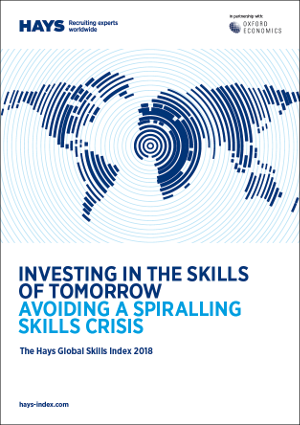Ungated Post | 24 Sep 2018
Investing in the skills of tomorrow; Avoiding a spiralling skills crisis

Attracting and retaining the right talent is crucial to an organisation’s success, wherever in the world it operates. For the seventh year running, this report––created in partnership with Hays, the global recruitment consultant––presents an exhaustive analysis of the labour market landscape in 33 countries, for the benefit of workers, firms, and policymakers.
Combining the local expertise of Hays with the analytical knowledge of Oxford Economics, the Hays Global Skills Index describes the latest shifts and trends in each labour market, and uses its unique Index to assess how easy or difficult it is for organisations to locate the skilled professionals they require.
The report also investigates the issue of slow wage growth, and related global trends such as the slowdown in productivity growth since the financial crisis. What does this mean for workforces of the future? How will they be impacted by the twin forces of globalisation and technology? Who will be the real winners and losers from the increasing adoption of automation and machine learning? We explore the wider implications of these trends for workers, and ask what this means for policymakers around the world.
Oxford Economics’ team is expert at applying advanced economictools that provide valuable insights into today’s most pressing business, financial,and policy issues.
To find out more about our capabilities, contact:
EMEA
Paul Donnelly
+44 (0)207 803 1416
Email
Americas
Diantha Redd
+1 (646) 503 3052
Email
Asia
Peter Suomi
+65 6829 7198
Email
Related Services

Post
The economic impact of abandoning the WTO
Oxford Economics have been commissioned by the International Chamber of Commerce (ICC) to provide an independent assessment of the economic impact of WTO dissolution. This report details our findings and the assumptions underpinning our analysis.
Find Out More
Post
The economic impact of the sports activities of public service media
This study shows how the sports activities of public service media supported €4.5 billion of GDP and 57,000 jobs across 31 European countries in 2022, taking direct, indirect (supply chain), and induced (wage-funded expenditure) impacts into account. The report also highlights wider economic benefits of public service media sports coverage, such as the way in which it leverages sponsorship income for sports bodies.
Find Out More
Post
Global Trade Education: The role of private philanthropy
Global trade can amplify economic development and poverty alleviation. Capable leaders are required to put in place enabling conditions for trade, but currently these skills are underprovided in developing countries. For philanthropists, investing in trade leadership talent through graduate-level scholarships is an opportunity to make meaningful contributions that can multiply and sustain global economic development.
Find Out More